I am running a query that gets progressively slower as records are added. Records are added continuously via an automated process (bash calling psql). I would like to correct this bottle neck; however, I don't know what my best option is.
This is the output from pgBadger:

Hour Count Duration Avg duration
00 9,990 10m3s 60ms <---ignore this hour
02 1 60ms 60ms <---ignore this hour
03 4,638 1m54s 24ms <---queries begin with table empty
04 30,991 55m49s 108ms <---first full hour of queries running
05 13,497 58m3s 258ms
06 9,904 58m32s 354ms
07 10,542 58m25s 332ms
08 8,599 58m42s 409ms
09 7,360 58m52s 479ms
10 6,661 58m57s 531ms
11 6,133 59m2s 577ms
12 5,601 59m6s 633ms
13 5,327 59m9s 666ms
14 4,964 59m12s 715ms
15 4,759 59m14s 746ms
16 4,531 59m17s 785ms
17 4,330 59m18s 821ms
18 939 13m16s 848ms
The table structure looks like this:
CREATE TABLE "Parent" (
"ParentID" SERIAL PRIMARY KEY,
"Details1" VARCHAR
);
Table "Parent" has a one to many relationship with table "Foo":
CREATE TABLE "Foo" (
"FooID" SERIAL PRIMARY KEY,
"ParentID" int4 NOT NULL REFERENCES "Parent" ("ParentID"),
"Details1" VARCHAR
);
Table "Foo" has a one to many relationship with table "Bar":
CREATE TABLE "Bar" (
"FooID" int8 NOT NULL REFERENCES "Foo" ("FooID"),
"Timerange" tstzrange NOT NULL,
"Detail1" VARCHAR,
"Detail2" VARCHAR,
CONSTRAINT "Bar_pkey" PRIMARY KEY ("FooID", "Timerange")
);
CREATE INDEX "Bar_FooID_Timerange_idx" ON "Bar" USING gist("FooID", "Timerange");
Additionally, table "Bar" may not contain overlapping "Timespan" values for the same "FooID" or "ParentID". I have created a trigger that fires after any INSERT, UPDATE, or DELETE that prevents overlapping ranges.
The trigger includes a section that look similar to this:
WITH
"cte" AS (
SELECT
"Foo"."FooID",
"Foo"."ParentID",
"Foo"."Details1",
"Bar"."Timespan"
FROM
"Foo"
JOIN "Bar" ON "Foo"."FooID" = "Bar"."FooID"
WHERE
"Foo"."FooID" = 1234
)
SELECT
"Foo"."FooID",
"Foo"."ParentID",
"Foo"."Details1",
"Bar"."Timespan"
FROM
"cte"
JOIN "Foo" ON
"cte"."ParentID" = "Foo"."ParentID"
AND "cte"."FooID" <> "Foo"."FooID"
JOIN "Bar" ON
"Foo"."FooID" = "Bar"."FooID"
AND "cte"."Timespan" && "Bar"."Timespan";
The results from EXPLAIN ANALYSE:
Nested Loop (cost=7258.08..15540.26 rows=1 width=130) (actual time=8.052..147.792 rows=1 loops=1)
Join Filter: ((cte."FooID" <> "Foo"."FooID") AND (cte."ParentID" = "Foo"."ParentID"))
Rows Removed by Join Filter: 76
CTE cte
-> Nested Loop (cost=0.68..7257.25 rows=1000 width=160) (actual time=1.727..1.735 rows=1 loops=1)
-> Function Scan on "fn_Bar" (cost=0.25..10.25 rows=1000 width=104) (actual time=1.699..1.701 rows=1 loops=1)
-> Index Scan using "Foo_pkey" on "Foo" "Foo_1" (cost=0.42..7.24 rows=1 width=64) (actual time=0.023..0.025 rows=1 loops=1)
Index Cond: ("FooID" = "fn_Bar"."FooID")
-> Nested Loop (cost=0.41..8256.00 rows=50 width=86) (actual time=1.828..147.188 rows=77 loops=1)
-> CTE Scan on cte (cost=0.00..20.00 rows=1000 width=108) (actual time=1.730..1.740 rows=1 loops=1)
**** -> Index Scan using "Bar_FooID_Timerange_idx" on "Bar" (cost=0.41..8.23 rows=1 width=74) (actual time=0.093..145.314 rows=77 loops=1)
Index Cond: ((cte."Timespan" && "Timespan"))
-> Index Scan using "Foo_pkey" on "Foo" (cost=0.42..0.53 rows=1 width=64) (actual time=0.004..0.005 rows=1 loops=77)
Index Cond: ("FooID" = "Bar"."FooID")
Planning time: 1.490 ms
Execution time: 147.869 ms
(**** emphasis mine)
This seems to show that 99% of the work being done is in the JOIN from "cte" to "Bar" (via "Foo") ... but it is already using the appropriate index... it's still just too slow.
So I ran:
SELECT
pg_size_pretty(pg_relation_size('"Bar"')) AS "Table",
pg_size_pretty(pg_relation_size('"Bar_FooID_Timerange_idx"')) AS "Index";
Results:
Table | Index
-------------|-------------
283 MB | 90 MB
Does an index of this size (relative to the table) offer much in terms of read performance? I was considering a sudo-partition where the index is replaced with several partial indexes... maybe the partials would have less to maintain (and read) and performance would improve. I have never seen this done, just an idea. If this is an option, I can't think of any good way to limit the segments given this would be on a TSTZRANGE value.
I also think adding the "ParentID" to "Bar" would speed things up, but I don't want to denormalize.
What other choices do I have?
Impact of changes recommended by Erwin Brandstetter
At the peak performance (hour 18:00), the process was adding 14.5 records per second consistently... up from 1.15 records per second.
This was the result of:
- Adding
"ParentID"to table"Bar" - Adding a foreign key constraint to
"Foo" ("ParentID", "FooID") - Adding
EXCLUDE USING gist ("ParentID" WITH =, "Timerange" WITH &&) DEFERRABLE INITIALLY DEFERRED(btree_gist module already installed)
